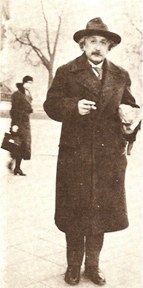The Berlin Years
Textos: Dr. Antonio Moreno González
After a short spell as the professor of theoretical physics in the university of Prague, he returned to Zurich after being appointed associate lecturer at his beloved Polytechnic School. In Prague he fell in with the Jewish community, experiencing first-hand their problems, and it was there that he first began to defend the Zionist cause. He did not spend long in the Polytechnic; in 1913, Planck and Nernst visited him in Zurich to propose a lucrative job at the Prussian Academy of Sciences (as director of the new Kaiser Wilhelm Institute for Physics) and the post of lecturer without teaching obligations at Berlin University. The offer could not have been more tempting, especially because it would free him from the strict timetable of the classes he loathed and the wages were good.
After the rich year of 1905, he had started to extend his theory of relativity, previously restricted to inert systems, to non inert systems. Although in previous successful work he had used Planck's preliminary drafts of the quantum theory of light to explain the photoelectric effect and drew inspiration from Lorentz's work for his special theory of relativity, he now found himself in an entirely novel and unprecedented situation. Working on his own (as he was to throughout his career), in 1907 he began to lay the first foundations of what would eventually become his general theory of relativity, published in Annalen der Physik .
This intense labour took its toll on his health; he developed a liver complaint and was diagnosed with a stomach ulcer. He was tended to by his cousin Elsa Loewentahl, whom he married in 1919, after divorcing Mileva. That year his predictions on the deflection of light passing through an intense gravitational field were confirmed. He penned a jubilant "Good news today!" in a letter to his mother, at that time convalescing in a sanatorium (she died the next year at Einstein's home in Berlin). The news reached scientific societies, was mentioned in the universities and finally made it to the international press: Very much against his will, Einstein had become irrevocably famous.
But neither public fame nor his scientific contributions prevented him from being persecuted and repudiated, even by some of his colleagues, for his Jewishness. As an antimilitarist, aligned with the Zionist cause and above all, as a morally upright person, he refused to give in to the anti-Semitic Nazi bullying of former corporal Adolf Hitler and his henchmen, who went so far as to put a price on Einstein's head: five thousand dollars. Weary of the situation, he eventually abandoned Europe for ever. On 7 October 1933 he set sail on the Westernland from Southampton in England to New York, in the company of Elsa, his wife, his secretary Helen Dukas and his then assistant, Walther Mayer. Days before he had given a speech at the Royal Albert Hall of London on "Science and Freedom" helping to raise one million pounds for German refugees, of whom he himself was now one.

Last photo in Berlin, 1 December 1932, taken by someone passing by
